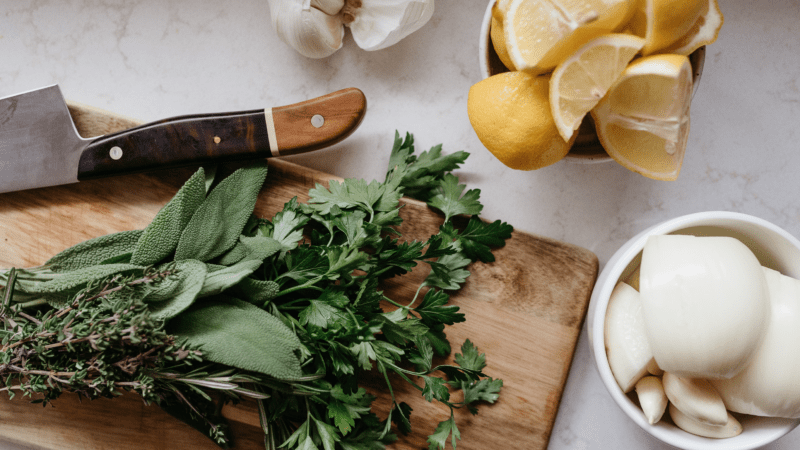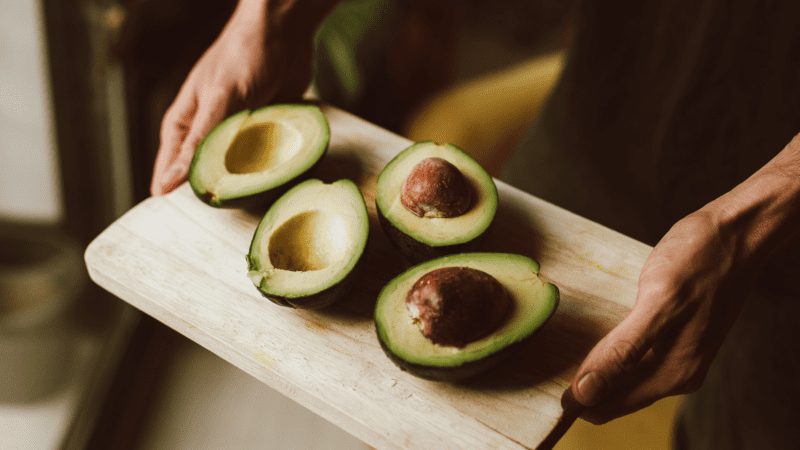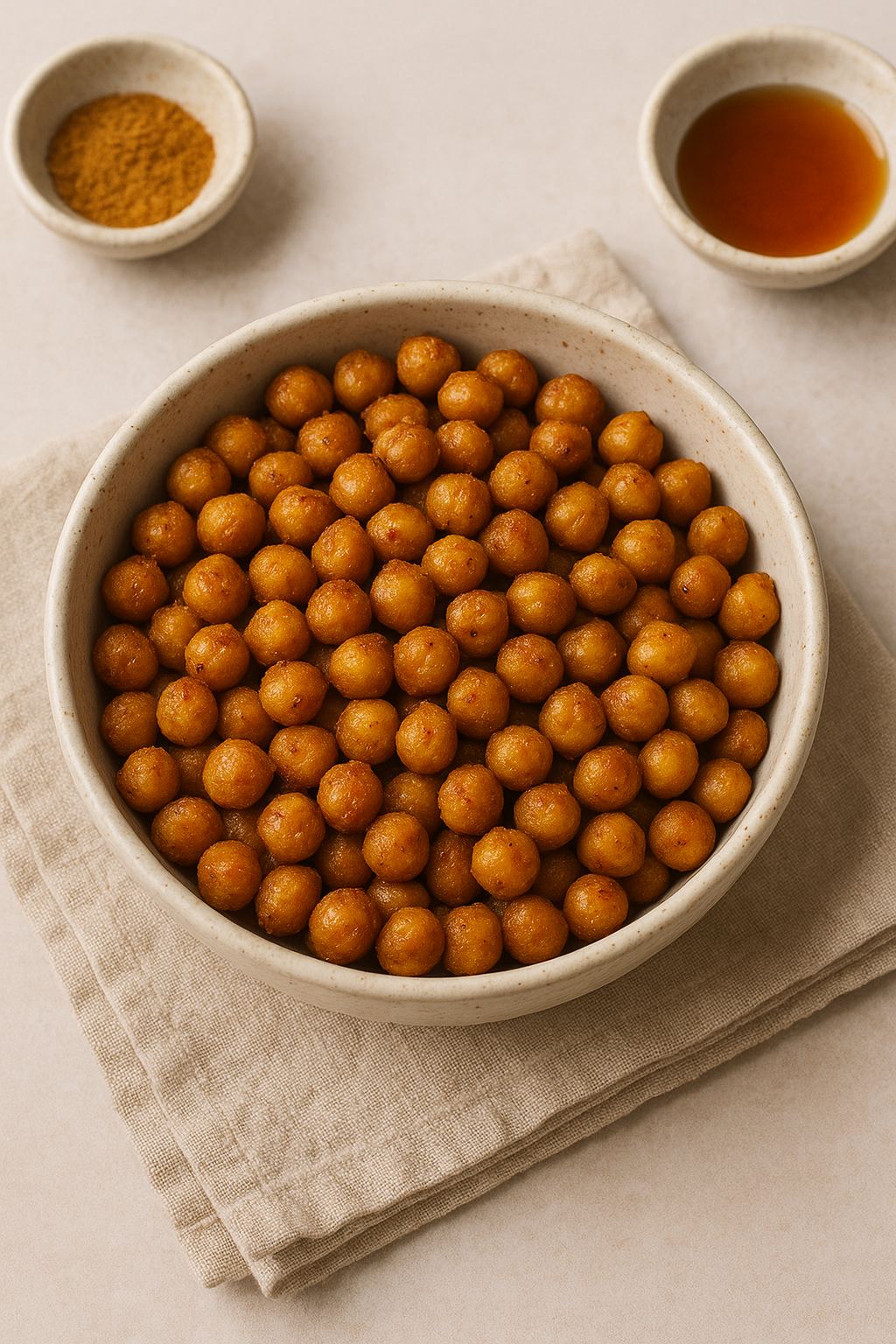Foods That Make a Difference
I always say how important it is to eat the rainbow–there’s almost no better gift to yourself than to make sure you’re getting your veggies and fruits, especially when it comes to heart health.
Nutrition, in all its deep, rich colors, plays a crucial role. Research shows that certain foods can protect your heart, reduce inflammation, increase your circulation, and help balance cholesterol levels. So let’s dive into the science behind heart-healthy eating and how to incorporate these foods into your everyday life.

Fiber-Rich Foods: Natural Cholesterol Regulators
When I talk about heart-healthy foods, I love to start with fiber because it’s so easy to get and it is so good for you. Fiber, particularly soluble fiber, helps lower cholesterol by binding to it in your digestive system and removing it before it enters your bloodstream (1).
Of course, you need fiber rockstars like Brussels sprouts, spinach, and broccoli. These veggies go well beyond just providing fiber, though, as they contain heart-protective antioxidants, polyphenols, and sulforaphanes (2). These green, leafy vegetables are rich in soluble fiber, fight artery-clogging sclerotics, and contain antioxidants that protect against inflammation.
When it comes to a heart-healthy meal, I like to make my Spinach and Walnut Pesto Zoodles, with walnuts, olive oil, and garlic. The walnuts and olive oil–packed with Omega-3 fatty acid– also deliver heart-healthy fats. And zucchini is a great way to get nitric oxide.
Or a Sweet Potato and Kale Hash– sweet potatoes are high in fiber and potassium, good for relaxing our vascular system, and kale offers anti-inflammatory compounds and antioxidants. Kale (and, by the way, beets) help boost nitric oxide, which aids in lowering your blood pressure (3).
Another option is Cauliflower Turmeric Steaks with olive oil. Cauliflower, like kale and broccoli, contains sulforaphanes, which have also been linked to protecting against atherosclerosis. Turmeric’s active compound, curcumin, helps reduce inflammation (by dilating your blood vessels) and oxidative stress, while olive oil supports heart health due to the Omega-3 fatty acids (4).
Fruits like apples and pears provide pectin, a type of fiber that helps remove cholesterol from your body (5). Berries, especially blueberries, contain anti-inflammatory properties as well. Many berries are full of anthocyanins (6), which have many heart-protective properties. I also recommend pomegranate seeds, which are high in antioxidants and polyphenols. By the way, I make sure to eat organic so that I’m eating the healthiest foods I can find. Organics contain less harmful pesticides and maximize nutrient density.
Legumes, including beans and lentils, are so filling and they also contain fiber and plant compounds that block cholesterol absorption.
Whole Grains. Oats contain beta-glucan, which has been shown to lower LDL cholesterol. I like to to prep Matcha Overnight Oats, with almond milk and maple syrup. Matcha contains EGCG, a polyphenol, delivering heart-protecting catechins, and lower blood pressure (7). I also top with blueberries, goji berries, and hemp for added flavor and an antioxidant boost.
Also, I like to make a Quinoa Salad with Lemon Tahini Dressing because quinoa provides fiber and plant protein, while olive oil, herbs, and fresh vegetables, like bell pepper and cucumbers offer antioxidants and healthy fats.

Healthy Fats: Balancing Cholesterol Levels
Speaking of healthy fats, they are high on the list, too! They play a crucial role in maintaining a balanced cholesterol profile. Monounsaturated and polyunsaturated fats help raise HDL (good) cholesterol, which removes LDL (bad) cholesterol from your arteries (8). These foods are some of my favorites so I make sure to include them in my diet whenever possible.
Monounsaturated Fats
Adding these fats to your meals can help balance cholesterol levels and promote cardiovascular health.
Avocados contain oleic acid, which helps reduce inflammation and LDL cholesterol (9).
Olive oil is packed with antioxidants that protect your heart.
Nuts, like almonds and walnuts, offer heart-healthy fats and plant sterols, which block cholesterol absorption.
Polyunsaturated Fats
Flaxseeds provide omega-3s that help lower blood pressure and inflammation.
Walnuts are rich in omega-3s and antioxidants that protect against oxidative stress.
Fatty fish, like salmon and mackerel, contain EPA and DHA, powerful omega-3s that reduce triglycerides, a type of fat in your blood, and improve arterial function (10).
Beyond Veggies and Fruits…
Let’s take a look at a couple of my favorite nutrient extras that you can use to augment your heart-healthy regimen.
Berberine
Berberine is a natural compound found in plants like Berberis aristata. It has been used in traditional Chinese medicine (TCM) for centuries, and modern research now confirms its ability to support heart health. This compound helps balance blood fats by lowering LDL cholesterol and triglycerides while raising HDL cholesterol. Additionally, berberine for blood sugar control can support overall metabolic health.
Berberine also helps regulate blood pressure. It encourages the production of nitric oxide, a molecule that relaxes blood vessels and improves blood flow, which can help lower blood pressure. And we know that chronic inflammation is linked to heart disease. Berberine reduces inflammatory markers in the body, which may protect the heart from damage (11).
Even more surprising is the gut-heart connection. Berberine benefits the gut, which in turn affects heart health by promoting the growth of good bacteria while reducing harmful bacteria. This balance helps produce beneficial compounds like short-chain fatty acids, which are known to improve heart function (12). High-quality supplements like Be My Berberine offer a bioavailable form of berberine, enhancing its effectiveness in promoting cardiovascular wellness.
Irish Sea Moss
Another natural supplement that’s so good for your heart is Irish sea moss. This type of red algae is packed with nutrients that support heart health in several ways. It’s rich in Omega-3 fatty acids, which reduce triglycerides and help prevent plaque buildup in arteries. It has essential minerals like potassium and magnesium, which help maintain normal blood pressure and heart rhythms.
And its anti-inflammatory properties are amazing. Compounds in Irish sea moss reduce inflammation, which is a significant risk factor for heart disease (13).
Incorporating Irish sea moss into your diet provides these essential nutrients that support overall cardiovascular health.

Tea: A Heart-Supporting Beverage
Drinking tea—particularly green or black tea—offers wonderful cholesterol-balancing benefits. Green tea contains catechins, which help reduce LDL cholesterol and prevent its oxidation (a process that can lead to plaque formation in your arteries). Regular tea consumption helps maintain HDL cholesterol levels (14).
Opt for unsweetened tea to maximize benefits, and be mindful of caffeine intake to avoid sleep disturbances, which can increase inflammation.
A Holistic Approach to Heart Health
By incorporating heart-healthy foods like green, leafy veggies, fruits, healthy fats, plus berberine, Irish sea moss, and teas into your diet, you can actively improve your heart health. These small changes—combined with a balanced lifestyle—can provide lasting benefits for your heart and overall wellness. So don’t hold back, give yourself the gift of a healthy heart!
xo – Serena
Citations
-
- https://www.health.harvard.edu/heart-health/11-foods-that-lower-cholesterol
- Evans PC. The influence of sulforaphane on vascular health and its relevance to nutritional approaches to prevent cardiovascular disease. EPMA J. 2011 Mar;2(1):9-14. doi: 10.1007/s13167-011-0064-3. Epub 2011 Feb 12. PMID: 23199123; PMCID: PMC3405367.
- Pollock RL. The effect of green leafy and cruciferous vegetable intake on the incidence of cardiovascular disease: A meta-analysis. JRSM Cardiovasc Dis. 2016 Aug 1;5:2048004016661435. doi: 10.1177/2048004016661435. PMID: 27540481; PMCID: PMC4973479.
- https://my.clevelandclinic.org/health/articles/17290-omega-3-fatty-acids
- https://www.webmd.com/vitamins/ai/ingredientmono-500/pectin
- Basu A, Rhone M, Lyons TJ. Berries: emerging impact on cardiovascular health. Nutr Rev. 2010 Mar;68(3):168-77. doi: 10.1111/j.1753-4887.2010.00273.x. PMID: 20384847; PMCID: PMC3068482.
- Kochman J, Jakubczyk K, Antoniewicz J, Mruk H, Janda K. Health Benefits and Chemical Composition of Matcha Green Tea: A Review. Molecules. 2020 Dec 27;26(1):85. doi: 10.3390/molecules26010085. PMID: 33375458; PMCID: PMC7796401.
- https://www.health.harvard.edu/heart-health/the-facts-on-fat-and-heart-health
- https://www.mayoclinic.org/diseases-conditions/high-blood-cholesterol/in-depth/cholesterol/art-20045192
- https://www.mayoclinic.org/drugs-supplements-fish-oil/art-20364810
- Neag MA, Mocan A, Echeverría J, Pop RM, Bocsan CI, Crişan G, Buzoianu AD. Berberine: Botanical Occurrence, Traditional Uses, Extraction Methods, and Relevance in Cardiovascular, Metabolic, Hepatic, and Renal Disorders. Front Pharmacol. 2018 Aug 21;9:557. doi: 10.3389/fphar.2018.00557. PMID: 30186157; PMCID: PMC6111450.
- Zhang L, Wu X, Yang R, Chen F, Liao Y, Zhu Z, Wu Z, Sun X, Wang L. Effects of Berberine on the Gastrointestinal Microbiota. Front Cell Infect Microbiol. 2021 Feb 19;10:588517. doi: 10.3389/fcimb.2020.588517. PMID: 33680978; PMCID: PMC7933196.
- https://health.clevelandclinic.org/sea-moss-benefits
- https://www.prevention.com/food-nutrition/healthy-eating/a63691103/benefits-of-tea/
by





